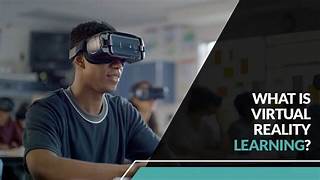The Psychological Effects of Virtual Reality on Learning Outcomes
In recent years, virtual reality (VR) has emerged as a transformative technology across various sectors, including education. Its immersive capabilities have the potential to revolutionize traditional teaching methods, creating dynamic and interactive learning environments. However, the psychological effects of VR on learners remain a critical area of inquiry, as understanding these impacts can optimize its application in educational settings. This article delves into how VR influences cognitive processes, emotional engagement, motivation, and learning outcomes, while addressing potential challenges.
Understanding Virtual Reality in Education
Virtual reality refers to a simulated, interactive environment that can replicate real-world scenarios or create entirely fictional experiences. Through the use of VR headsets and haptic devices, learners are fully immersed in a three-dimensional world that engages multiple senses. This level of immersion can significantly enhance the learning process by fostering active participation and experiential learning.
Cognitive Effects of VR on Learning
Enhanced Memory Retention
One of the most profound effects of VR is its ability to improve memory retention. Immersive environments engage learners’ visual and spatial memory systems more effectively than traditional methods. For instance, a biology student exploring the anatomy of a human body in VR can visualize and recall complex structures more accurately than through textbook illustrations.
Improved Spatial Awareness
VR is particularly beneficial for subjects that require spatial understanding, such as architecture, engineering, and geography. Navigating through a virtual representation of a building or a historical site provides learners with a deeper spatial awareness, which traditional 2D mediums cannot replicate.
Active Learning and Problem-Solving
Interactive VR scenarios encourage active learning, where students are not passive recipients of information but active participants in problem-solving exercises. This experiential learning approach helps develop critical thinking skills and enhances the ability to apply theoretical knowledge in practical contexts.
Emotional Engagement and Learning Outcomes
Increased Motivation
The novelty and interactivity of VR stimulate curiosity and enthusiasm among learners. Gamified VR experiences, where educational tasks are integrated into game-like settings, significantly boost motivation. Students are more likely to stay engaged and complete tasks when the learning environment is both challenging and enjoyable.
Emotional Connection
Virtual environments can evoke strong emotional responses, making lessons more impactful. For example, a history lesson set in a VR reconstruction of a historical event allows learners to empathize with the people and circumstances of the time, creating a deeper understanding and emotional connection to the material.
Social and Collaborative Learning
VR platforms often include features that enable collaboration in shared virtual spaces. Students can interact with peers and instructors in real-time, working together on projects or engaging in discussions. This social learning aspect fosters teamwork and communication skills, which are critical in modern education.
Psychological Challenges of VR in Learning
Cognitive Overload
While VR enhances learning by presenting complex information visually, it can also overwhelm learners. Too much sensory input or overly complex environments may lead to cognitive overload, reducing the effectiveness of the learning experience.
Simulator Sickness
Some learners experience discomfort, nausea, or dizziness while using VR, commonly referred to as simulator sickness. This physiological response can detract from the learning experience and limit the duration of VR use.
Dependency and Isolation
Over-reliance on VR for education may reduce face-to-face interactions and real-world problem-solving opportunities. This dependency could hinder the development of interpersonal skills and the ability to navigate real-world challenges.
The Role of VR in Enhancing Accessibility
Inclusive Learning
VR offers unique opportunities for learners with disabilities. For instance, students with mobility challenges can virtually visit locations or participate in activities that would otherwise be inaccessible. Additionally, VR can provide tailored learning experiences for students with learning disabilities, catering to their specific needs.
Language and Cultural Barriers
Language learners can immerse themselves in virtual environments that simulate real-world interactions, enhancing their linguistic and cultural understanding. Similarly, VR can expose students to diverse cultures and perspectives, fostering global awareness.
Real-World Applications and Case Studies
Medical Training
Medical students use VR to practice surgeries or explore anatomical structures in a risk-free environment. This hands-on approach enhances their confidence and skills before they engage with real patients.
STEM Education
VR is revolutionizing science, technology, engineering, and mathematics (STEM) education by providing interactive simulations. For example, students can conduct virtual experiments in physics or chemistry labs, offering a safe and cost-effective alternative to traditional methods.
History and Social Sciences
Virtual field trips enable students to explore historical landmarks or participate in reconstructed historical events, making history lessons more engaging and memorable.
Language Learning
Language learners can practice real-life conversations in virtual settings, such as restaurants, markets, or workplaces, improving fluency and cultural competence.
Future Directions and Research
The potential of VR in education is vast, but further research is necessary to address its psychological impacts and optimize its application. Key areas for exploration include:
- Long-Term Effects: Investigating how prolonged use of VR affects cognitive development, attention span, and learning outcomes.
- Personalization: Developing adaptive VR systems that cater to individual learning styles and paces.
- Ethical Considerations: Addressing concerns related to data privacy, psychological dependency, and equitable access to VR technologies.
Conclusion
Virtual reality holds immense promise in transforming education by enhancing cognitive engagement, emotional connection, and learning outcomes. While it offers significant benefits, educators and developers must remain mindful of its psychological challenges and ethical implications. By leveraging VR responsibly and inclusively, we can unlock its full potential to create a more engaging, effective, and accessible learning experience for students worldwide.


